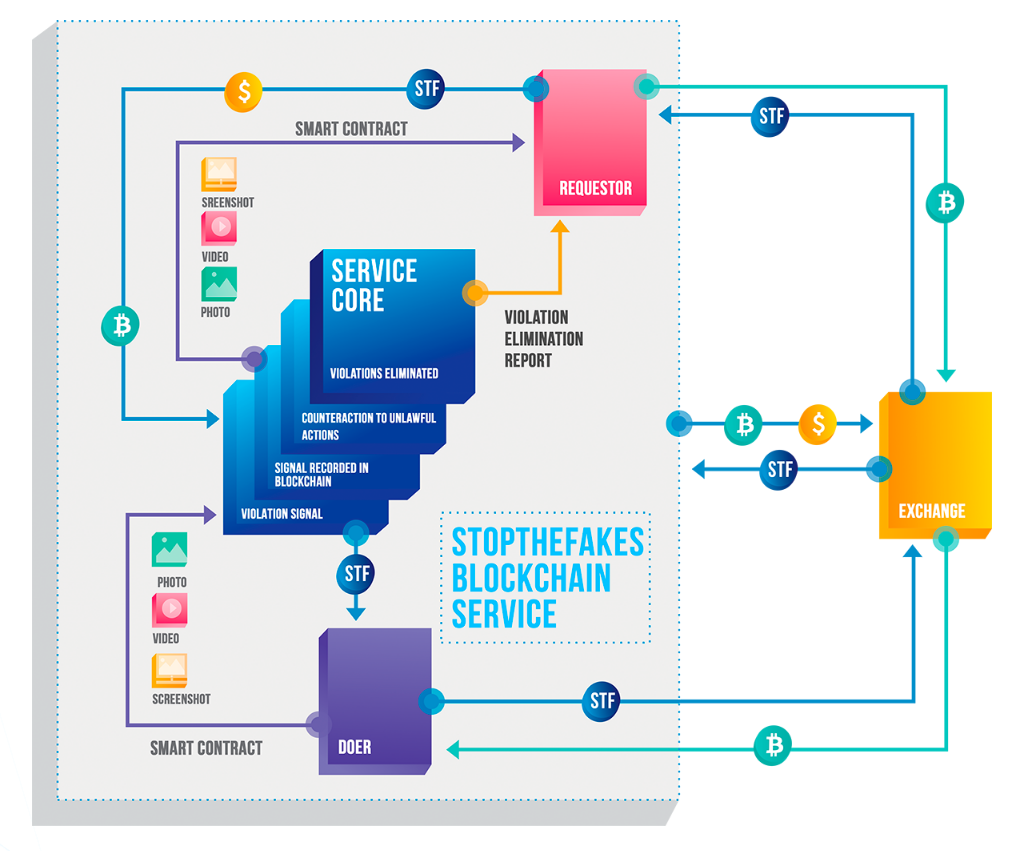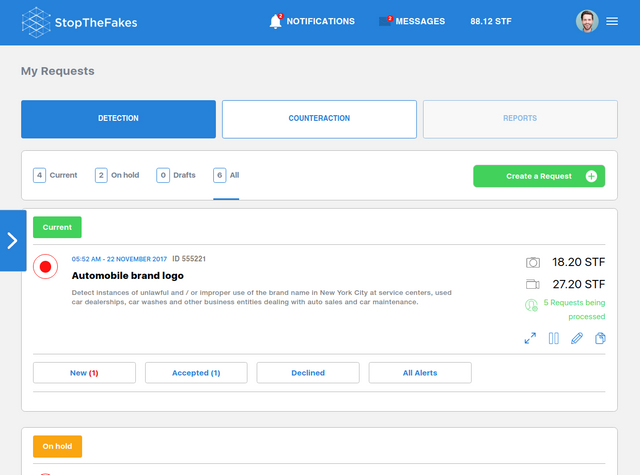ICO review - Stop The Fakes
My elevator pitch for the ICO of "Stop The Fakes" would be
"Stop The Fakes is a gamified micro-tasking system that turns everyone on the planet into an agent to protect your intellectual property rights".
In as much as you believe intellectual property rights should exist or are not a criminal attempting to ignore them for personal gain, then I think most people would believe the idea of Stop The Fakes is a good thing. Eliminate fake products. Eliminate un-attributed ripping off content (something that most Steemians are clear is a good thing).
However if you want more details here is their diagram of "How it works":
Basically, IP owners aka "requestors" submit requests detailing how and where they believe their IP might be being infringed and what evidence they are looking for. A network of "doers" select requests to investigate and look for IP infractions. They send submissions to the system with the evidence, probably by a mobile app, and then the submission is filtered for bad input, passed onto the requestor for validation and potential enforcement. The doers allegedly remain anonymous to all but STF (although I can imagine cases where enforcement would require them to participate in a legal process as part of the evidence provenance process - I would hope that would remain voluntary if they could risk prosectuation or retribution if their identity was known to the party in violation.
I'd give the vision of STF the highest marks if it didn't have potential scaling issues mostly due to its centralization and creation of a closed system. Those I think may limit its growth potential and open the door for competitors to build a better and more successful system. In as much as they can evolve as they get users and try to grow they may be able to exploit first-mover advantage here - really the winner will be the one that gets most customers and doers using the system.
There is also very little original tech here - it's a synthesis of existing things, it just pulls them together in a convenient way, tailored for a specific vertical - IP infraction detection and correction (hopefully). Some of these things are already present in other dApps eg. microtask and piecemeal work marketplaces (e.g. Storm), copyright registration (e.g. Binded and Ascribe). The element I see as unique (so far) is using geo-tracking of infraction reports and big-data/machine-learning (AI) to detect clustering and trends of reported infractions. That could really help IP owners and be a strong value-add.
In general I think it is frustrating that so many dApps are showing up that are re-inventing instead of reusing tech. That's because it is pretty hard and risky to integrate with other dApps. Ideas like District0x are hoping to solve that so apps with similar needs can collaborate and share functionality and data - well that's the hope.
If I was building this from scratch I'd look to divide into services where I could plug in existing blockchain services instead of building from scratch:
- Identity system for doers (eg. Blockpass or Civic)
- Microtasking marketplace (possibly Storm or something like it)
- Copyright / IP registration
- Industry specific selection/training and training of doers and filtering their submissions without human touch
- Dispute arbitration (Sage?)
- Suggest possible requests for IP owners
- Enforcing violations detected
All these except perhaps the micro-tasking should be pluggable so that a given requestor can define how their requests and doers submissions are processed, checked and arbitrated.
By making 6 and 7 pluggable that would allow someone with no knowledge of this space to have others do all the work of driving STF for them. They could just upload an image and allow any third party to then create requests on their behalf to protect it, and any third party to then enforce compliance for them perhaps sharing any bounty with those parties - and the doer. These are things missing from STF and if added make it a lot easier to use and more scalable. As would making 4 and 5 able to use 3rd party services.
Imagine for a minute one of the worlds biggest industries and heaviest users of the Internet - adult entertainment (aka porn) using this service. The kind of filtering the need applying to doers submissions would be pretty unique - rejecting porn and illegal content in submissions would just not work because the IP is porn. So clearly you need industry specific filtering. Ideally an adult video company would want to provide access to a canonical version of their product, or extracts of it, then have requests of a form appropriate for their industry automatically generated, subsets of doers made eligible (those legally allowed to and willing to access and search adult sites) and then perhaps experts in DMCA infringement enforcement dolling out the disputes and take down notices, perhaps collecting penalties as necessary.
Bigger companies and brands would probably not do that - they have their own in house people, but for everyone else it opens the market to even more people who are IP enforcement experts to use the platform. However access to a pool of doers and the gamification, microtasking, and registration and analysis of submissions would still be a very valuable tool for them.
Problems I see would be for doers either being overwhelmed with the variety of requests, requestors not being good at creating effective requests that doers can use - causing lots of human touch to validate and arbitrate submissions, or just a lack of submissions and quality requests. At that point you may need something like a BPO to manage teams of trained doers, or at least to recruit and train them. (That could be another service in the platform - recruiting and training doers either in a general or IP specific way). I guess only time will tell how well this works IRL.
As for the team of STF - well I think they have a bunch of people with very relevant experience in the problem domain. I can't say how good the single tech guy is or if they can execute. But in general I feel like they are above average.
The investment potential is driven in the short term by the hefty 40% day-1 pre-ICO bonus which has potential for a quick turnaround if you aren't interested in the long term. That's not so great for the participants in the public-IOC phase who get a maximum of 15% bonus.
Beyond the ICO we may see some pops as the product rolls out and hopefully gains adoption. Beyond that the only mechanism for appreciation in STF value is supply and demand for STF tokens. The more requestors there are buying STF tokens to pay doers the more demand there is and the higher the price is. Initial ICO valuation is 1 STF = $0.45 (without bonus) and the floor for doer payment is around $5 for the simplest task. That is also a problem because in some parts of the world $5 is 5 days pay and others it is the price of a coffee at Starbucks. Allowing regional pricing may be a feature they need to think about for the future. It seems like they will need a very large amount of volume to move the pricing up significantly. And if there was a lot of volatility they may need to deal with pricing rewards in local fiat not STF - or use a reserve to stabilize it for the duration of requests, or use an internal pegged coin not tradable outside of STF.
They have a demo of the UI accessible from the website that gives an idea of how it will look but it is certainly not the real thing. Some of the prior concerns I mentioned definitely apply - like discovery of appropriate requests by doers since any reasonably successful system will quickly have thousands if not millions of requests leading to a significant headache for all concerned. Matching requestors to doers will be an art in and off itself. But I give them an above average 4 because they have at least a UI demo and the alpha product should be available in Feb which is before the public ICO begins.
A thing noticeably missing from their website is any indication of content companies that are wanting to use it. I would hope at this stage the could have had some early partners especially in the aforementioned adult entertainment business, or physical product manufacturers such as fashion and cosmetics. That would give some real validation that they are creating a product that IP owners will want to use.
One aspect of this product that I like is that it generates a new income opportunity for those in countries where fakes are most prevelant. It could create an army of competitive and highly incentivized workers, funded from overseas, who are actively tracking down and reporting fakes. Anyone with a mobile phone can become a snitch (oops I mean "agent") who can participate in the process, make real money, increase their reputation and get more jobs. IP owners should love it. It could also create a whole new service industry that buys rights to reported infractions and delas with enforcement collecting a bounty. It's somewhat like being a bail bondsman, bounty hunter, repo man, or buying up bad debt cheaply and then trying to collect on it.
Note US Citizens and residents are not allowed to participate in the ICO for STF.


Good post. Nice info
very nice, I see your posts add to the science and I'll try it that way, maybe I'm still a beginner, if you have time to spare can be guided me and sharing our knowledge and we can share knowledge news about steemit.
To be honest i dont like this project. Strong IP law enforcement is OK with products like drugs, baby food ect, things that can be really dangerous for users. With all others its very naive thinking that world would be a better place without counterfeited products, and making people to be agents of big corporations for small money will profit only big corporations. This is all more complicated and complex subject. Lets take worker from Thailand or Cambodia who gets 60-250USD/monthly salary in clothing factory that produces football t-shirts Nike or Adidas and he is a football fan himself, should he go to Nike shop and buy original ex. F.C. Barcelona shirt for 100USD? Or go to local market and buy knock off for 15USD and spend rest his shitty salary for cheap food and accommodation for his family. He watches the same games as rich people that can easily afford original one and marketing message from TV saying (buy t-shirt) works same for him. In 8/10 cases people know that they are buying knock offs and reason is that they cannot afford original one but they still wants to have glimpse of product that they see in advertising or its just fashion. Anybody thinks that people that are buying LV bag for 100USD on some shady market are getting cheated and if there is no seller they will go to original LV store and buy bag for 10000USD must be a moron. There is a big subject of big corporations using very bad practices in many countries too, dont become their cheap agent. Grey sphere is very important part of every emerging economy, this is place where small guys can become bigger guys and move on to "proper" projects. Like many people that are investing in crypto now, with dreams of using this funds for future plans. Stop fakes YES, when it harm people or easily can be replaced by original product, in other cases think twice.
this is shitty scam
https://shitcoinoffering.com/stopthefakes-ico-pinkertons-from-russia/